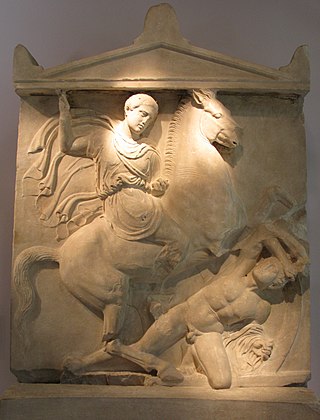The 4th century BCE started the first day of 400 BC and ended the last day of 301 BC. It is considered part of the Classical era, epoch, or historical period.

The 5th century BC started the first day of 500 BC and ended the last day of 401 BC.

Year 378 BC was a year of the pre-Julian Roman calendar. At the time, it was known as the Year of the Tribunate of Medullinus, Fidenas, Lanatus, Siculus, Pulvillus and Macerinus. The denomination 378 BC for this year has been used since the early medieval period, when the Anno Domini calendar era became the prevalent method in Europe for naming years.

This article concerns the period 409 BC – 400 BC.
This article concerns the period 349 BC – 340 BC.
This article concerns the period 399 BC – 390 BC.
This article concerns the period 379 BC – 370 BC.
This article concerns the period 389 BC – 380 BC.
This article concerns the period 369 BC – 360 BC
This article concerns the period 359 BC – 350 BC.
Year 396 BC was a year of the pre-Julian Roman calendar. At the time, it was known as the Year of the Tribunate of Saccus, Capitolinus, Esquilinus, Augurinus, Capitolinus and Priscus. The denomination 396 BC for this year has been used since the early medieval period, when the Anno Domini calendar era became the prevalent method in Europe for naming years.
Year 356 BC was a year of the pre-Julian Roman calendar. At the time, it was known as the Year of the Consulship of Ambustus and Laenas. The denomination 356 BC for this year has been used since the early medieval period, when the Anno Domini calendar era became the prevalent method in Europe for naming years.
Year 388 BC was a year of the pre-Julian Roman calendar. At the time, it was known as the Year of the Tribunate of Capitolinus, Fidenas, Iullus, Corvus, Flavus and Rufus. The denomination 388 BC for this year has been used since the early medieval period, when the Anno Domini calendar era became the prevalent method in Europe for naming years.
Year 367 BC was a year of the pre-Julian Roman calendar. At the time, it was known as the Year of the Tribunate of Cossus, Maluginensis, Macerinus, Capitolinus, Cicurinus and Poplicola. The denomination 367 BC for this year has been used since the early medieval period, when the Anno Domini calendar era became the prevalent method in Europe for naming years.

Chabrias was an Athenian general active in the first half of the 4th century BC. During his career he was involved in several battles, both on land and sea. The orator Demosthenes described him as one of the most successful commanders Athens ever had:
To sum up the whole: he is the only general who never lost a single city or post or ship or soldier, when he commanded you: none of your enemies has any trophy over you and him, while you have many over many enemies under his command.

The Corinthian War was a conflict in ancient Greece which pitted Sparta against a coalition of city-states comprising Thebes, Athens, Corinth and Argos, backed by the Achaemenid Empire. The war was caused by dissatisfaction with Spartan imperialism in the aftermath of the Peloponnesian War, both from Athens, the defeated side in that conflict, and from Sparta's former allies, Corinth and Thebes, who had not been properly rewarded. Taking advantage of the fact that the Spartan king Agesilaus II was away campaigning in Asia against the Achaemenid Empire, Thebes, Athens, Corinth and Argos forged an alliance in 395 BC with the goal of ending Spartan hegemony over Greece; the allies' war council was located in Corinth, which gave its name to the war. By the end of the conflict, the allies had failed to end Spartan hegemony over Greece, although Sparta was durably weakened by the war.

Nectanebo II was the last native ruler of ancient Egypt, as well as the third and last pharaoh of the Thirtieth Dynasty, reigning from 358 to 340 BC.

Djedhor, better known as Teos or Tachos, was an ancient Egyptian pharaoh of the 30th Dynasty.
Philiscus or Philiskos was a 4th-century BC Greek tyrant of the city of Abydos, on the Asian side of the Hellespont, and a hyparch ("vice-regent") and military commander of the Achaemenid satrap Ariobarzanes. He was sent by Ariobarzanes in 368 BCE as an Achaemenid emissary to Delphi, where the Greek cities at war between themselves had assembled for peace negotiations. Philiscus had probably been sent at the request of either Athens or Sparta, to help solve the conflicts between the Greek city-states.






